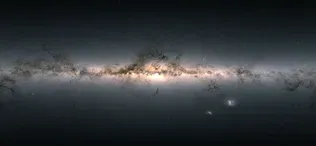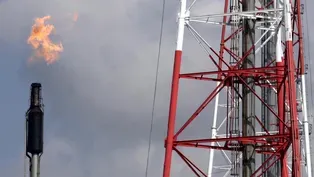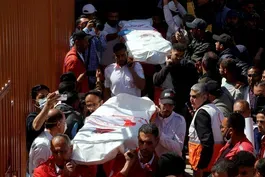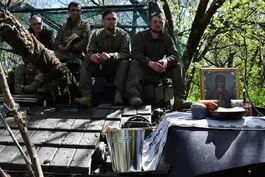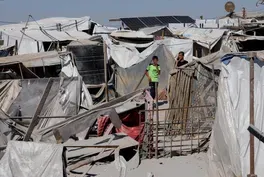
April 20, 2025 - PBS News Weekend full episode
4/20/2025 | 26m 45sVideo has Closed Captions
April 20, 2025 - PBS News Weekend full episode
April 20, 2025 - PBS News Weekend full episode
Problems with Closed Captions? Closed Captioning Feedback
Problems with Closed Captions? Closed Captioning Feedback
Major corporate funding for the PBS News Hour is provided by BDO, BNSF, Consumer Cellular, American Cruise Lines, and Raymond James. Funding for the PBS NewsHour Weekend is provided by...

April 20, 2025 - PBS News Weekend full episode
4/20/2025 | 26m 45sVideo has Closed Captions
April 20, 2025 - PBS News Weekend full episode
Problems with Closed Captions? Closed Captioning Feedback
How to Watch PBS News Hour
PBS News Hour is available to stream on pbs.org and the free PBS App, available on iPhone, Apple TV, Android TV, Android smartphones, Amazon Fire TV, Amazon Fire Tablet, Roku, Samsung Smart TV, and Vizio.
Providing Support for PBS.org
Learn Moreabout PBS online sponsorshipJOHN YANG: Tonight on PBS News Weekend, the Easter truce falters as Russia and Ukraine accuse each other of launching hundreds of attacks.
Then, what eliminating the environmental justice offices at the EPA could mean for poor and minority communities.
And after a decade mapping billions of stars across the Milky Way and beyond, a groundbreaking spacecraft retires.
MAN: We were witnessing something big that was ending and there was many emotions and there was tears in the room.
(BREAK) JOHN YANG: Good evening, I'm John Yang.
Tonight, Russia and Ukraine are blaming each other for breaking the one day Easter ceasefire that Russian President Vladimir Putin had declared.
Ukrainian President Volodymyr Zelenskyy said Russia never ceased firing and attacks continued after Putin's announcement.
Russia said it was Ukraine that broke the truce, shooting at Russian positions and launching drone attacks killing civilians.
Today the State Department said the United States is committed to achieving a full and comprehensive ceasefire.
William Taylor is a distinguished fellow at the Atlantic Council's Eurasia Center.
He was U.S. ambassador to Ukraine under George W. Bush and the temporary head of mission there in the first administration of President Trump, later testifying in his impeachment.
So this ceasefire that one side declares and ends up, this devolves into this finger pointing.
What do you make of this?
WILLIAM TAYLOR, Former U.S.
Ambassador to Ukraine: They're probably not serious.
That that is, Putin was not serious.
He's declared cease fires before and violated them.
Zelenskyy said 30 hours ceasefire, no, 30 days cease fire.
Zelenskyy said if we want a serious ceasefire, do the ceasefire that President Trump and President Zelenskyy agreed on a comprehensive 30-day cease fire, air, land and sea.
And if that's, if you're serious, Mr. Putin, go for that kind of a ceasefire.
JOHN YANG: This past week, U.S. Officials, Secretary of State, the president sounded like their patience may be running out.
Here's what President Trump said on Friday.
DONALD TRUMP, U.S. President: If for some reason one of the two parties makes it very difficult, we're just going to say you're foolish, you're fools, you're horrible people, and we're going to just take a pass.
But hopefully we won't have to do that.
JOHN YANG: Is this part of the bargaining or are they serious about walking away?
WILLIAM TAYLOR: Well, John, if the president is irritated at one of the two who's not serious, he must be irritated at Putin, which would be unusual, but he must be irritated at Putin because Putin's the one who said no to him, to President Trump, and is the one who said no, I'm not going to abide by what I agreed to and thus you remove sanctions.
In other words, he has not been bargaining in good faith, and President Putin is dragging this out by all accounts.
So if there's anyone to be irritated with, it is Putin.
And if that's the case, then President Trump has some leverage to put on Putin to bring him back to the table.
JOHN YANG: Dragging this out to what end?
Putin.
WILLIAM TAYLOR: Putin wants to drag this out so that he gradually takes more.
His overall goal, John, as you've reported, is to control Ukraine.
That's what he started out doing during 2008, 2014, 2022.
It's to control Ukraine that he thinks is not really a nation, it's really just part of Russia.
So he wants to eliminate Ukraine.
That's his goal.
And he thinks he can wait us out.
He thinks he can wait the Europeans out.
He thinks the Ukrainians might break.
They're not breaking.
We shouldn't break either.
JOHN YANG: There are some analysts who say that walking away would be a benefit for Putin.
But you disagree.
WILLIAM TAYLOR: Walking away would be an admission that one of the top priorities of the U.S. Government, the new U.S. government, is impossible to do.
Now, Putin probably needs this ceasefire.
His economy's in bad shape.
Ukrainians are eager for the ceasefire as well.
I mean, they've been fighting for over three, three years and two months.
They've been holding off the Russian army and have brought them to a standstill, a virtual standstill.
They're tired.
The Ukrainians are tired.
They want this ceasefire, but they don't want to be under Russian control.
So they're going to continue to fight until they can get that ceasefire and a settlement that is good for them.
JOHN YANG: When Secretary Rubio and President Trump talking about walking away or sort of throwing up their hands, is it just in the talks or do you think they'll also pull the support for the Ukrainians?
WILLIAM TAYLOR: That's the right question to ask that.
And we've seen what happens when they pull support with the weapons, the intelligence.
It's bad for the Ukrainians.
Ukrainians will continue to fight, as I just said, they will continue to fight in any case.
But if the Americans pull off from the actual negotiations, but continue to support them with weapons and intelligence and diplomatic, then the Ukrainians can continue to make it.
JOHN YANG: Given your knowledge, your expertise, your background, your experience, how do you think this is going to play out?
WILLIAM TAYLOR: I think the Ukrainians will continue to resist.
They will continue to resist the Russians.
I think Putin will continue to try to drag out this administration and try to drag out this fight.
And I think that they will both get tired and I think Ukraine will move on once that happens to joining the EU and reconstructing what it still controls and eventually I think joining NATO, that's a hard one that's going to be out there, but I think that's where Ukraine will be and Russia will continue to threaten them.
JOHN YANG: And what role will the United States be playing in this?
WILLIAM TAYLOR: I hope the United States will be supporting the Ukrainians.
That's what will be in our interest.
That's what the United States will do in our own interests so that Russia does not control Ukraine and threaten Europe, where our soldiers are.
We've got soldiers there and that will be a threat to them.
JOHN YANG: Former Ambassador William Taylor, thank you very much.
WILLIAM TAYLOR: John, thank you.
JOHN YANG: In tonight's other news, the Israeli military says professional failures led to the killing of more than a dozen Palestinian medics in Gaza last month.
That's the conclusion of an internal investigation following the discovery of a shallow grave holding the bodies of 14 Red Crescent medics and a U.N. worker.
The report said the troops were operating in a hostile and dangerous combat zone and that investigators found several professional failures, breaches of orders and a failure to fully report the incident.
Initially, Israel said troops had opened fire on vehicles that were approaching in a suspicious manner.
But cell phone video recovered later from one of the victims showed the ambulance's emergency lights were flashing.
Israel has long accused Hamas of using ambulances to transport fighters and weapons.
The Israeli military said a deputy commander will be fired for providing an inaccurate report of the incident.
Three states say they have their first measles cases of the year.
State health officials in Missouri, Louisiana and Virginia report one case each.
They're not believed to be related and all stem from recent international travel.
According to the latest CDC numbers, there have been 800 confirmed cases this year and three deaths from measles.
96 percent of cases involve people who are unvaccinated or whose vaccination status is unknown.
Pope Francis Easter Sunday at the Vatican was different from years past.
He didn't preside over Easter Mass, but he did offer a blessing from a balcony overlooking St Peter's Square.
The pontiff also blessed some children in the crowd who when he drove around the square in the Pope Mobile.
Those gathered for the high holy day said they were happy to see the 88-year old recovering from a bout of double pneumonia.
SOFIE DAHL, Visitor from Copenhagen: When I walked up here, I felt very excited to see all the people here and have never seen the Pope.
So it's very great for me to see him and I felt a bit emotional seeing him.
JOHN YANG: The pope also met briefly with Vice President J.D.
Vance, who's in Rome with his family.
The Vatican said the two exchanged Easter greetings.
Aides presented Vance with gifts for his family, including chocolate, eggs for his children, rosaries and a Vatican tie.
And a U.S. astronaut celebrated his 70th trip around the sun by returning to Earth.
MAN: And touchdown.
Soyuz MS26 is home.
JOHN YANG: Astronaut Don Pettit and two Russian cosmonauts landed in Kazakhstan Saturday, which was Pettit's birthday.
The trio spent 220 days on the International Space Station conducting research and experimenting with 3D printing and water sanitation.
Pettit will undergo medical checks overseas before going to the Johnson Space center in Houston, where he will re acclimate to Earth's gravity.
Still to come on PBS, Newsweek, what closing EPA's environmental justice offices may mean for poor communities around the country and a star mapping space observatory that changed astronomy bids farewell.
(BREAK) JOHN YANG: For three decades, EPA offices were established nationwide to address the disproportionately high levels of pollution in poor and minority communities.
Now the Trump administration is eliminating these environmental justice offices as part of its effort to end DEI programs and to cut what it sees as wasteful spending.
Ali Rogin recently spoke with Amudalat Ajasa, who covers environmental health for the Washington Post.
ALI ROGIN: Amudalat, thank you so much for joining us.
First of all, let's talk about the history of the environmental justice movement and how did it become a part of what the EPA does?
AMUDALAT AJASA, Environmental Health Reporter, The Washington Post: Yeah.
The history of the environmental justice movement really recognizes the fact that everybody deserves access to clean air, water and the land that they live on.
Right.
And that was really introduced into the government over 30 years ago by Bill Clinton.
He recognized the fact that these inequities needed to be addressed at the government level because it wasn't happening elsewhere.
It developed 30 years ago, but folks really felt like their voices were heard under the Biden administration.
You know, although some of them felt like the administration didn't go far enough in the legislation that they did pass to make sure that they had cleaner air and water, they felt like for the first time, the risks that they faced were really acknowledged.
ALI ROGIN: What are some specific examples of environmental justice policies at work and the types of problems that this office set out to address?
AMUDALAT AJASA: Some of the policies at work really limited the amount of pollution that industry would be able to pump into the air, the soot that would be allowed to linger in the air, other specific chemicals that they really went after, benzene and other things that for folks who live in Cancer Alley.
That's a day to day reality for them.
ALI ROGIN: Tell us about Cancer Alley, what is that?
AMUDALAT AJASA: Yeah, Cancer Alley is an 85 mile stretch in Louisiana that is full of industry that is pumping a lot of air, pollutants.
And these communities on the front line, they get the name is dubbed Cancer Alley because for them cancer is a reality.
Cancer, you know, it's either somebody close to them that has cancer, somebody in their family, or they know people in their community.
So they have these hot pockets of not just cancer, but other health ailments that the normal American wouldn't be dealing with.
But because they're exposed to so many chemicals on a day to day basis, that's their reality.
ALI ROGIN: I want to play for you.
We spoke to a former EPA environmental justice employee.
He now works at the Natural Resources Defense Council.
Here's how he explained how he worked with community members he was serving.
MATTHEW TAJEDA, Former Director, EPA Office of Environmental Justice: We had a tribal community that was sure that the drinking water that they used for their families and for their animals was contaminated with radioactive toxic elements in it.
We worked with them to make sure that were hearing what was going on with this community.
We provided them with technical assistance and eventually a grant that supported that community in actually testing their own drinking water for levels of radioactivity.
And sure enough, their water was radioactive.
ALI ROGIN: So how are these communities reacting to these offices now being closed?
AMUDALAT AJASA: These communities are devastated.
These communities are gutted.
I mean, the environmental justice office really served as a liaison for the community and the government.
They were on the front lines in many instances in these regions, really connecting with people and understanding what their local challenges were, you know, considering.
Like he talked about water contamination, air contamination, wanting to have electric school buses and solar panels.
So they really understood what was happening on the front lines and they were the voice for those communities and the government.
So to have that office be completely gutted for many of them makes them feel like there a lot of that relationship is now being cut.
And it's a true unraveling of not only what the Biden administration worked to do, but the 30 years of environmental justice work that has been happening in this country.
ALI ROGIN: I want to read for you a statement from EPA Administrator Lee Zeldin.
He says that environmental justice sounds like a good idea in theory and receives bipartisan support.
But in reality, environmental justice has been used primarily as an excuse to fund left wing activists instead of actually spending those dollars to directly remediate environmental issues for those communities.
What do you make of that?
AMUDALAT AJASA: These offices weren't just helping specific DEI communities or, you know, leftist woke communities, but they were helping everybody.
You know, I went to Cancer Alley for a story that I worked on and I was amazed but also shocked by the flares that would go off that kind of lit up the sky, almost like it almost looked like fireworks in a weird way.
And the smells that I smell, you know, I got a headache being in those communities for almost an hour of just driving.
And that's experiences were every day.
It leaves a lot of people who live on the front lines of these communities abandoned, you know, and it means that for the future that they might be sicker.
It means that they have a sicker future.
It means that they don't have as much clean air as they were starting to develop.
It means that their water could be contaminated and there's really nobody there to help them.
ALI ROGIN: I'm Amudalat Ajasa with the Washington Post.
Thank you so much for joining us.
AMUDALAT AJASA: Thank you so much for having me.
JOHN YANG: Since the collapse of the ceasefire between Israel and Hamas in early March, Gaza has not received any deliveries of food, water, fuel or medical supplies as Israel has blocked all humanitarian aid that's left Gazans in dire straits.
Earlier I spoke with Gavin Kelleher of the Norwegian Refugee Council, who's in Gaza.
GAVIN KELLEHER, Norwegian Refugee Council: The situation here on the ground in Gaza is one of utter desperation.
People are already running out of the things that they need to stay alive.
Civilians are being attacked incessant military violence.
People are being displaced in their hundreds of thousands.
More than 420,000 people displaced in the last month alone.
And people are being denied access to the basics they need to survive, including food and dwindling access to water.
JOHN YANG: Is it possible to single out one greatest need?
GAVIN KELLEHER: I would say that access to food at this point has reached a really critical juncture.
Most families in Gaza are now surviving on just one meal a day.
Many of those families are splitting that meal in half just to try to get through the day.
People are exhausting their coping mechanisms now to access food.
People are selling their belongings, they're selling their clothes, trying to access cash to get food.
Others are bartering.
On social media, you see posts for people trying to sell diapers or exchange diapers for a bag of lentils or cooking oil.
Begging is also overwhelming at this point.
But of course, very few people have any ability to assist now because nothing has entered Gaza for almost 50 days.
JOHN YANG: Talk about that.
The renewal of fighting, the new blocking aid getting into Gaza.
50 days.
Had things been getting better before that?
GAVIN KELLEHER: In the period during the ceasefire, were able to scale up our shelter response.
Access to food was improved.
The markets were increasing in capacity.
When the ceasefire collapsed, though, everything changed.
So nothing had come in, there were no supplies coming in.
But needs are growing as more and more people are being displaced in this violence and we're unable to support them now.
Humanitarian organizations on the ground have had our hands tied.
JOHN YANG: How is the situation affecting your group's ability to operate?
GAVIN KELLEHER: We have empty warehouses at this point.
We have a small number of supplies left in the south that we will continue distributing over the next week.
Other than that, we're contracting water trucks so people can still have some access to clean drinking water.
But everything here is on a knife's edge.
At any point now, we could run out of access to fuel, which is needed to continue producing water in Gaza and to continue moving it around.
And the hunger that is growing here now is becoming the number one priority for people on the ground.
And as an organization, we're not able to bring any supplies in.
There's nothing that we can do at this point other than continue to call for the crossing points into Gaza to be opened.
JOHN YANG: Yesterday, Israeli Prime Minister Benjamin Netanyahu said Israel had no choice, in his words, but to continue fighting in Gaza.
He said the war won't end before they destroy Hamas, free the hostages, and make sure that Gaza is no longer a threat to Israel.
What do you say to that?
GAVIN KELLEHER: I think we have to separate out the obligations that Israel has under international humanitarian law at this point.
Every single truck of aid that Israel is denying from entering Gaza is risking becoming a death sentence for people here who have already run out of food on the ground.
And it is unacceptable to employ collective punishment on this scale for 2.1 million people in pursuit of military objectives.
JOHN YANG: The Israelis, of course, say that they are fighting Hamas, they're not fighting Gazans.
Is it possible to separate the effect between the two?
GAVIN KELLEHER: It's not possible to separate the effect between the two at this point.
We continue to see dozens of airstrikes a day.
We continue to see babies, infants, children, women, men being blown apart who are very clearly civilians in these waves of military violence, we're also seeing the collective punishment with denial of any aid response.
So right now we are seeing civilians in Gaza suffer.
And that is undeniable at this point because Israel is pursuing military objectives without enough consideration for the civilians that are here on the ground.
JOHN YANG: You say that things are on a knife's edge.
Is it possible to say that if you don't get aid by a certain point, it's going to be the point of no return?
GAVIN KELLEHER: We expect that in the next week to two weeks, the community kitchens, which are providing maybe one meal a day to around half of the families in Gaza, will fully exhaust their supplies.
But I think you can imagine if you built a wall around an American city of 2.1 million people and stopped letting anything come in at all for 50 days and continue to pursue that policy, of course we are going to see unavoidable deaths here in the tens of thousands if the siege is not lifted in the coming weeks.
JOHN YANG: Gavin Kelleher in Gaza, thank you very much.
GAVIN KELLEHER: Thank you.
JOHN YANG: Finally this past week, astronomers at Cambridge University made headlines when they said they'd spotted indications of possible life on a distant planet using data from the James Webb Space Telescope.
Now, another space based observatory that's changed what we know about the universe is retiring.
The European Space Agency's craft, known as Gaia, is leaving behind a legacy of stunning discoveries.
JOHN YANG (voice-over): Gaia began its working life in 2013.
Launched with a clear mission.
Map our galaxy and tell its story.
The space observatory is equipped with an array of telescopes and instruments.
For more than a decade, it had slowly spun about a million miles from Earth, charting the precise locations of nearly 2 billion stars.
ANTHONY BROWN, Leiden University: I don't think anyone can imagine living without Gaia data anymore.
JOHN YANG (voice-over): Astronomer Anthony Brown of Leiden University in the Netherlands leads Gaia's data processing and analysis.
ANTHONY BROWN: Because we have the positions and brightness and colors of 2 billion stars in the sky, we can actually make a very beautiful all sky map of the Milky Way.
JOHN YANG (voice-over) But Gaia has helped create more than just beautiful maps.
Its data led to the revelation that 10 billion years ago, the young Milky Way collided and merged with a smaller galaxy.
Scientists are still exploring the cosmic fallout.
ANTHONY BROWN: A lot of the stars from that, let's say, intruder are still around, and we can identify them thanks to Gaia.
JOHN YANG (voice-over): Gaia completed one of the most comprehensive celestial catalogs in history, revealing more than half a million new stars within a cluster known as Omega Centauri.
Many of them zip through space at several hundred thousand miles an hour.
So far, Gaia's data has been used in more than 13,000 studies.
Brown used it to chart the path of stars in our night sky and predict their movements for the next 1.6 million years.
Its detection of a faint wobble in a star led to Princeton astrophysicist Joshua Winn's discovery of a massive planet many light years away.
JOSHUA WINN, Princeton University: Stars are very massive and they don't move very much in response to the gravity of a planet.
But the Gaia spacecraft is providing just the kind of data that we need.
JOHN YANG (voice-over): Cornell astronomer Lisa Kaltenegger used Gaia's findings to determine what planets outside our solar system would have a clear view of Earth, part of the search for life elsewhere.
LISA KALTENEGGER, Cornell University: More than a thousand stars could see us.
And we know which ones those are, because the Gaia mission gave us that information.
One out of five stars has a planet that's just at the right distance.
So not too hot, too close to the star, and not too cold, not too far away to potentially be like ours.
JOHN YANG (voice-over): A decade of hard work nearly exhausted Gaia's fuel.
It was time to say goodbye.
Its team on Earth sent the final commands to shut it down.
They also sent farewell messages, which will forever be stored in the spacecraft's onboard memory.
JOHANESS SAHLMANN, Mission Project Scientist: We are hundreds of people, more than a thousand, that work together.
JOHN YANG (voice-over): Physicist Johaness Sahlmann is mission project scientist.
JOHANESS SAHLMANN: We were witnessing something big that was ending.
And there was many emotions and there was tears in the room.
JOHN YANG (voiceover): Gaia's work may be done, but it left plenty to do on Earth.
Researchers have processed only about a third of the data it gathered.
JOHANESS SAHLMANN: At the end of next year, we will publish the next big data release.
Then this will open up again another treasure trove for all the scientists in the world to exploit.
JOHN YANG: Last month, Gaia's thrusters fired one last time to send it toward the galaxy's most familiar star.
The Milky Way's premier cartographer will spend the rest of its days orbiting the sun, taking a place of its own in our night sky.
JOHN YANG: And that is PBS News Weekend for this Sunday.
I'm John Yang.
For all of my colleagues, thanks for joining us.
Happy Easter.
Have a good week.
Gaia bids farewell after a decade of mapping the stars
Video has Closed Captions
Gaia space observatory bids farewell after a decade of mapping the stars (4m 7s)
How the closure of EPA offices puts poor communities at risk
Video has Closed Captions
How the closure of EPA offices puts poor and minority communities at risk (5m 19s)
News Wrap: Israel finds ‘failures’ in killing of Gaza medics
Video has Closed Captions
News Wrap: Israel finds ‘failures’ that led to killing of Palestinian medics in Gaza (3m 16s)
Ukraine, Russia trade blame for breaking Easter ceasefire
Video has Closed Captions
Ukraine and Russia trade blame for breaking Easter ceasefire as talks to end war drag on (5m 38s)
‘Utter desperation’ in Gaza amid Israel’s aid blockade
Video has Closed Captions
‘Utter desperation’ in Gaza after ceasefire collapse and Israel’s aid blockade (4m 58s)
Providing Support for PBS.org
Learn Moreabout PBS online sponsorshipSupport for PBS provided by:
Major corporate funding for the PBS News Hour is provided by BDO, BNSF, Consumer Cellular, American Cruise Lines, and Raymond James. Funding for the PBS NewsHour Weekend is provided by...
